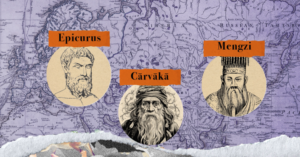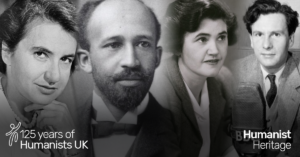 We can find humanist ideas over 2,000 years ago in ancient India, China, and Greece. Humanist thinking became increasingly popular during a period called the Enlightenment in the 18th century. Many of the thinkers who have been influential on humanism would not have used the word ‘humanist’ to describe themselves. However, their approach to answering questions and making choices without the need for religion means that many humanists today see them as part of the humanist tradition.
We can find humanist ideas over 2,000 years ago in ancient India, China, and Greece. Humanist thinking became increasingly popular during a period called the Enlightenment in the 18th century. Many of the thinkers who have been influential on humanism would not have used the word ‘humanist’ to describe themselves. However, their approach to answering questions and making choices without the need for religion means that many humanists today see them as part of the humanist tradition.
For more information see our teaching resources in the history and influence area.
Take a look at our short animation: Humanist History: from radical ideas to common sense.
It is important to recognise that the words ‘humanist’ and ‘humanism’ have been used in different ways, in different disciplines, and in different parts of the world throughout history. Sometimes there may be connections between these uses, but other times not. The ‘humanism’ this website explores is a non-religious worldview. You can find more on the history of the word in the first section of this chapter of the The Wiley Blackwell Handbook on Humanism.

in 2021 Humanists UK celebrated its 125th birthday! Our Humanist Heritage website explores the rich history and influence of humanism in the UK, featuring map, timeline, and hundreds of people, places, and organisations.
Teachers may find the history of humanism in 100 objects of particular interest.
Humanists UK
39 Moreland Street
London EC1V 8BB
education@humanists.uk
@HumanismEdu

© Humanists UK 2025. Registered Charity No. 285987
humanists.uk | Privacy
Illustrations by Hyebin Lee